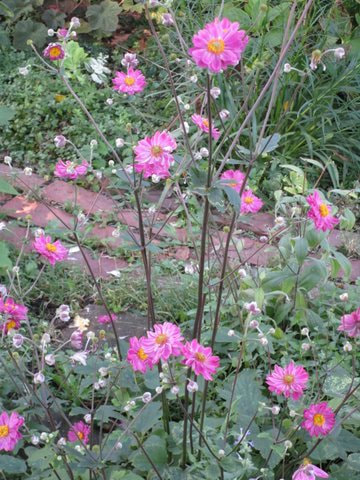Unsolicited Press
|
I began writing poetry -- again -- when I started planning a garden for our new home.
The house is small, the yard is small, though it came with a neighboring 'unbuildable' lot. So we would have more yard space than typical for our neighborhood in the satellite city of Quincy, Mass., a mile or so from the Boston line. The physical activity involved in gardening, as I found (or remembered), is great for thinking. Not the hard work of digging beds and laying borders of stone or brick, but the slow work of planting, weeding, trimming, watering, dead-heading, and mulling things over. Walking around staring at plants and perspectives. Sitting in the dirt to feel the breeze, or take in the light. Loosening the earth, and grooming the plants. Or listening to the birds, and the wind. Plant time is meditative. If you keep your hands reasonably busy, or your senses engaged, your thoughts can go where they will. The birds sing their poem all day. They may have only one, but they're not reluctant to broadcast it over and over again. They seem to expect an answer; you think, "the world is the answer." The bees keep busy. They may be dawdling around inside the same blossoms their mates examined just a few minutes before, but that doesn't kept them from doing their due diligence. Butterflies cannot stay still for a second. When, on occasion, you do find one seemingly glued to a specific flower (often, appropriately, on a 'butterfly bush') for hours on end, you have to keep a protective eye out for them. Especially, if you have a godzilla-sized praying mantis about the property. In these less goal-directed moments, words come. You hear yourself say thesm, and try to remember to write something down. Generally you can't remember quite what it was. I had noticed, before this time, that in the years when I was writing prose fiction or creative nonfiction, that some of the pieces being published -- the short ones -- were descriptions of mood, or weather, or brief encounters with people or animals. I was writing prose, but some of it was lyrical. Not a great different in tone or style from the poetry I 'used to' write when I was young. So maybe I had never stopped writing poetry, although I had clearly stopped seeking publication. During the years when I was teaching college composition courses, and then working for newspapers, I told myself I did not have enough time (or not the time I wanted) to do all the creative writing I wished to. I had to choose, to focus on what I most desired to do. I chose to write literary novels; then discovered, not entirely to my surprise, that no one in the world of "traditional publishing" wished to publish them. When the financial decline of the newspaper industry cut back my work, I found myself in the fortunate position of having the time to do what I wanted. Planting a garden became possible; writing poems again. The two seemed to come together. The poems in "Cocktails in the Wild" are not 'garden poems,' though "Voluptuous," the poem the editors chose for the book's back cover comes from those hours outdoors. The poems in "Cocktails" are a mixture: political pieces satirizing or bewailing our contemporary political traumas; travel poems; poems about the people in my life. Poems responding to local conditions, such as the frozen weather after the death of a friend, and to universal conditions -- Keats's nightingale, the latest mysteries of subatomic physics, the international dimensions of discussing a computer problem with a technician in India. Poetry is the tool-kit of the imagination. Everything is a subject. Most of the poems in "Cocktails" have been published in journals, many of them in the online journal Verse-Virtual.com, for which I've had the happy fortune to serve as contributing editor. But the garden helped to open the gate for me, and I walk through it gratefully all the seasons of the year. *** Robert Knox is the author of Cocktails in the Wild. Comments are closed.
|
Popular Topics
All
We Support Indie Bookshops |

